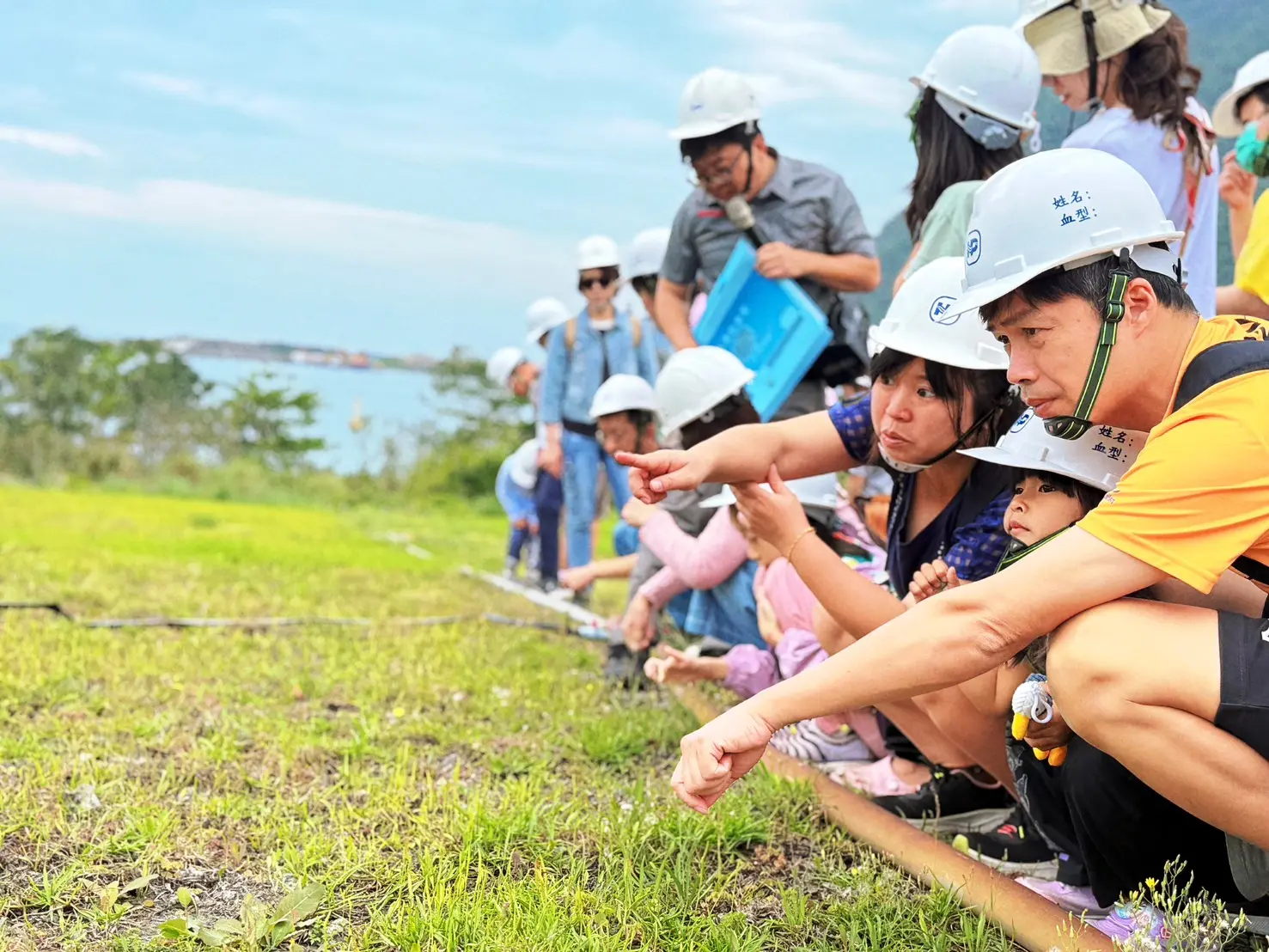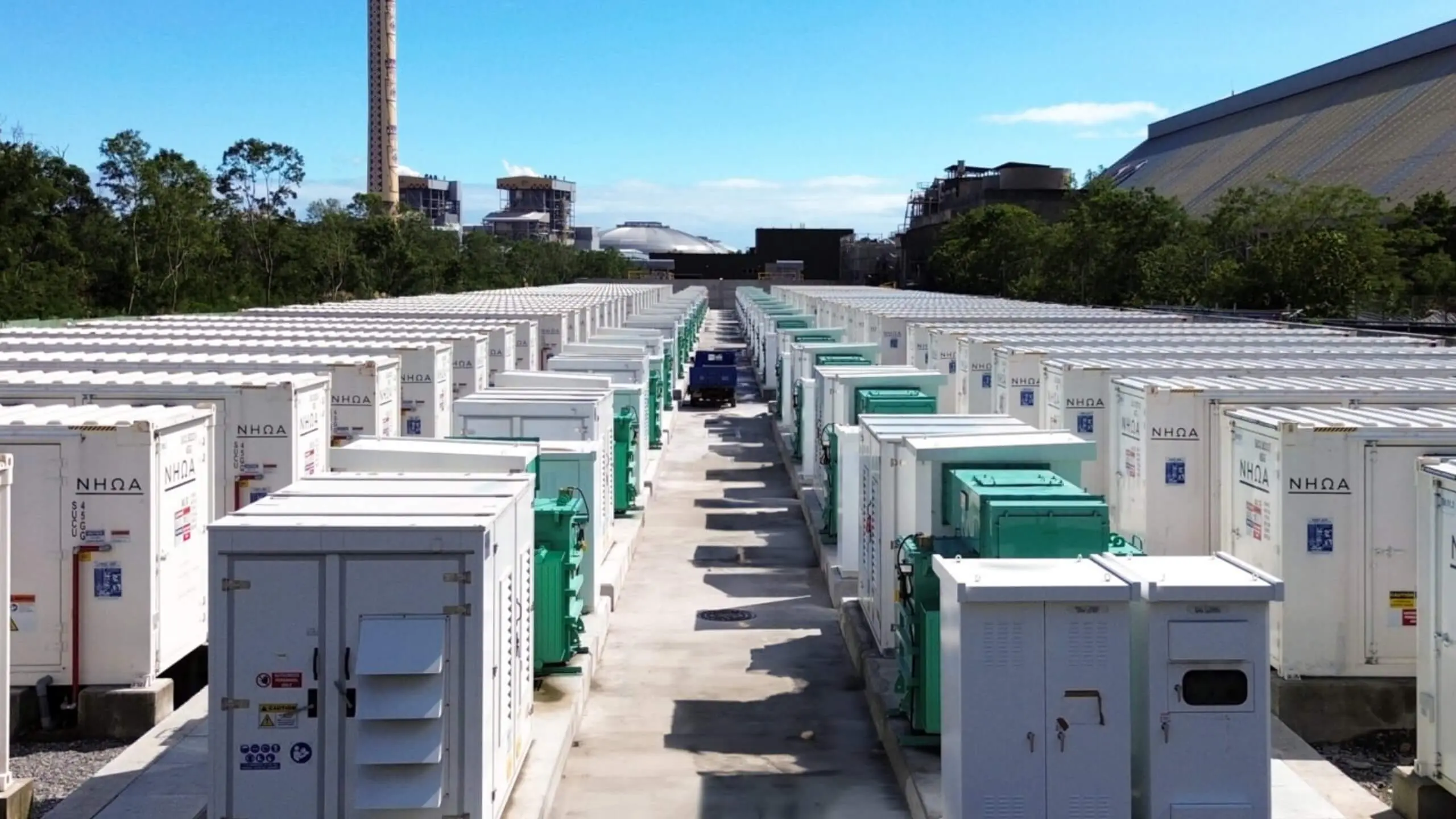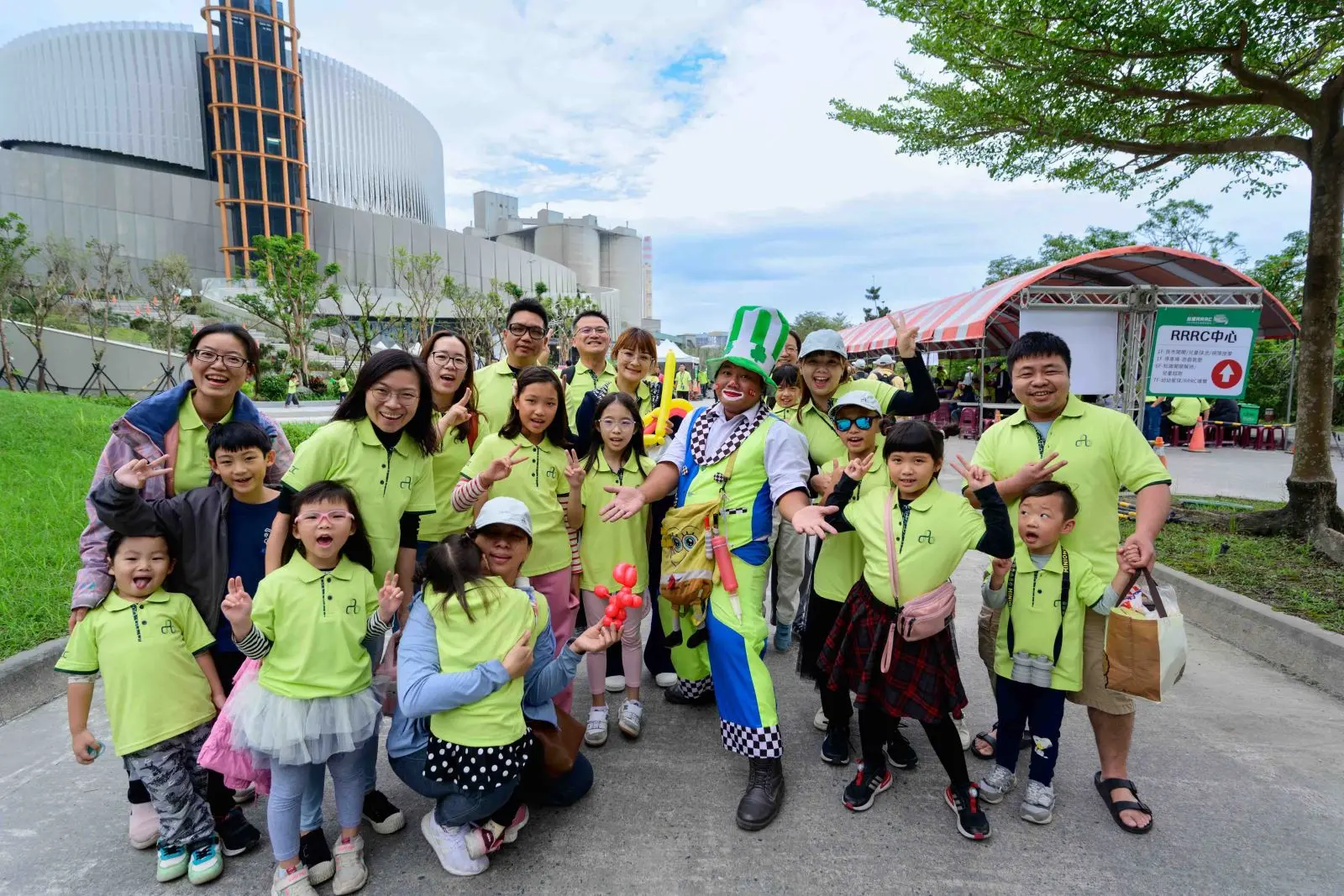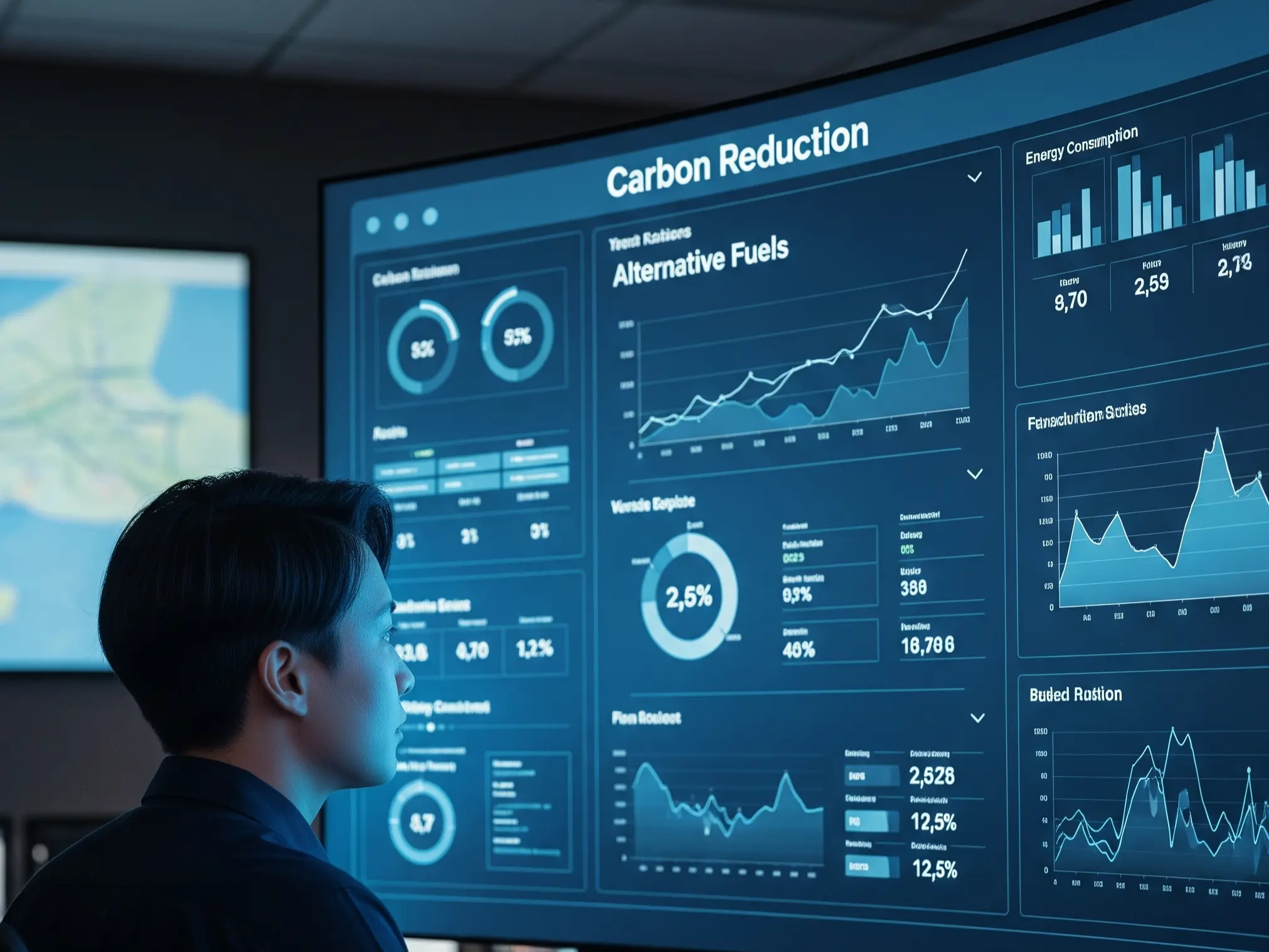Stakeholder Engagement
TCC values the opinions of its stakeholders, actively communicating and engaging with regard to material sustainability issues, which are incorporated in the corporate sustainable development blueprint. In line with the nature of the industry and with reference to the GRI Standards, SASB Standards, and Dow Jones Sustainability Index (DJSI) as well as AA1000 Stakeholder Engagement Standard, it employs the five principles, i.e. Responsibility, Influence, Tension, Diverse Perspectives, and Dependency in the identification and ordering of stakeholder significance.
The mechanism of communication and reporting will be conducted at least twice each year. The status of stakeholder communication for 2024 was reported to the Board of Directors on March 12, 2025, and the status of stakeholder communication for 2025 was reported to the Board of Directors on December 4, 2025.
Assessment Process for Stakeholders and Material Topics
Step and Action
Key Performance

Identify stakeholders
Department heads complete a survey to rank and identify key stakeholders.
- categories of stakeholders identified

Zoom in on the sustainability issues of TCC
List sustainability issues based on global trends, ratings.
- 25 sustainability issues
- cover corporate governance, economy, environment, and people and human rights

Assess impacts of sustainability issues on the economy, environment, people and human rights
Hold a workshop on material topics, invite VP-level supervisors to identify impacts, and ask each unit to send survey in Chinese and English to 10 internal/external stakeholders to capture the levels of impact.
- 337 questionnaires collected

Assess impacts of sustainability issues on operation
The Corporate Sustainable Development Committee and VP-level supervisors assess sustainability impacts on operation and rate the significance based on the "level of impact" and"likelihood" of respective impacts.
- 8 VP-level and above supervisors discussed at management meeting

Double materiality assessment & analysis
Summarize internal/external survey results, map double materiality matrix, link issues and TCC sustainability strategies, and decide material topics for 2024.
- 12 material topics identified by the Corporate Sustainable Development Committee

Determine material topics
Submit the 12 material topics identified to the Board of Directors to ensure these material topics are aligned with the business risks and strategies of TCC.
- Submitted to the Board of Directors compliance of in sustainability and integrity
Identification of Sustainability Issues
TCC conducts a sustainability issue assessment every two years. This year, the Company adopted the Double Materiality analysis principle in accordance with the GRI Universal Standards 2021. In compiling the sustainability issue list, TCC comprehensively considered global sustainability development trends, international sustainability rating frameworks (such as MSCI, S&P CSA, and CDP), sustainability disclosure standards (such as GRI Standards, and SASB Standards), industry characteristics, and best practices of industry peers. Stakeholders' opinions on each issue were surveyed, evaluating both the impact on corporate value and impact on the economy, environment, people, and human rights. A thorough evaluation of positive and negative impacts was conducted from both internal and external organizational perspectives. Material sustainability topics for the year were then identified based on the level of impact and likelihood of occurrence.
Through the double materiality analysis, eight material sustainability topics were identified, including “climate action and net-zero emissions”, “resource co-processing”, “green energy and energy storage”, “R&D innovation”, “low-carbon products and services”, “biodiversity”, “legal compliance” and “workplace health and safety”. Meanwhile, considering that “pollution control and management” and “water resources management” have a higher negative impact on the economy, environment, people and human rights, and are the focuses in the industry disclosure of various sustainability disclosure standards, both are also included in the material sustainability topics this year. In addition, in the human-centered, TCC puts employee inclusion and common good into practice. After discussion at the management meeting, “talent cultivation and development” and “local inclusion” are included in the material topics this year as well.
TCC has maintained the 12 material sustainability topics identified in the 2023 analysis. The results of the materiality assessment were approved by the Board of Directors. Also, the development and achievement on these material sustainability topics are linked to the executive remuneration. The materiality analysis process and results have been independently assured by Deloi e Taiwan, a third-party assurance provider, in accordance with ISAE 3000 (Revised), and verified by BSI Taiwan in accordance with the GRI Standards and AA1000AS v3 Type 1 Moderate Assurance Level.
TCC Double Materiality Matrix
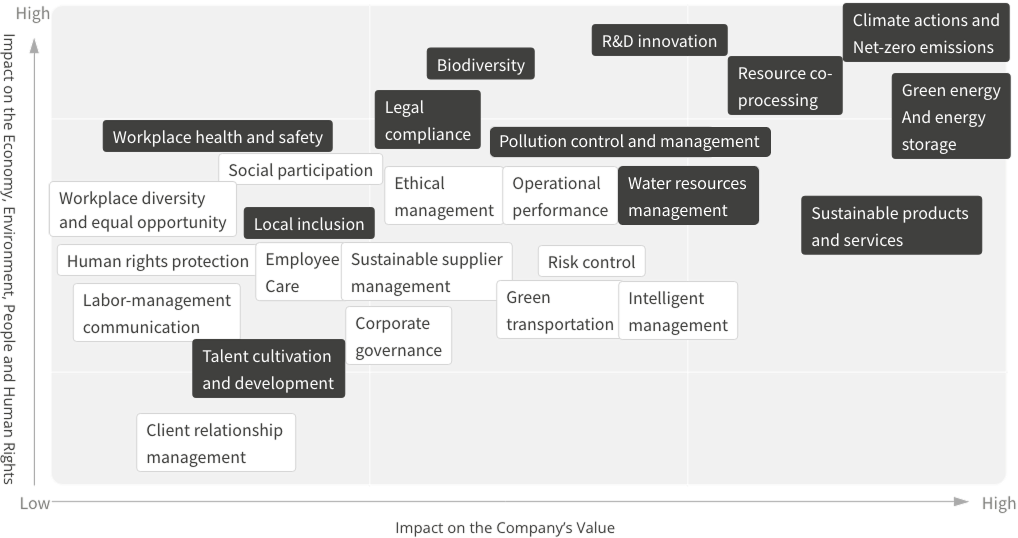
Stakeholder Identification Results
Referring to the AA1000 Stakeholder Engagement Standard (SES), TCC identifies and prioritizes the key stakeholders based on the five principles, i.e., Responsibility,
Influence, Tension, Diverse Perspectives, and Dependency.

Government &
Competent Authorities
They affect policy and industry development and care TCC's legal compliance

Shareholders &
Investors
They fund TCC and care for operational performance and sustainability

Clients
They value TCC's quality, services, operations, compliance, and environmental protection efforts

Employees
The key for ongoing breakthroughs and innovations as a crucial human capital at TCC

Suppliers/
Contractors
Partner in quality improvement and jointly address environmental and social issues

Media
They help TCC in disclosing and communicating sustainability related actions

Local Communities
Residents near TCC sites concern about its local operations

Industry Associations/ Industrial & Academic Organizations
They partner to advance the industry and share business insights

Sustainability
Associations
They are concerned about TCC's sustainability actions, and share the latest trends with TCC

Environmental Groups/
NGOs
They value TCC's environmental, employee, and community efforts and urge more progress
Stakeholder engagement programs
TCC is convinced that only with smooth and effective engagement with its stakeholders can TCC capture the pulses in the markets, economy, society, and environment, and ultimately put TCC's sustainability missions of "Nature First" and "Benefit to Society" into action. As a result, TCC implements stakeholder engagement programs that are applied to all local operations and stakeholder categories. These programs include conducting local stakeholder or community impact assessments to understand the potential effects of operations on stakeholders. Concurrently, TCC systematically designed sustainability issue survey questionnaires, with which it collects and analyzes feedback of stakeholders; meanwhile, it evaluates the impacts and risk levels of sustainability issues on corporate operation, identifying material issues and prioritizing responses and reactions to meet stakeholders' expectations toward TCC.
Upholding the spirit of open transparency, TCC not only establishes clear communication channels but also discloses information through diverse formats, ensuring effective and quality communication results with its stakeholders. TCC proactively meets with local stakeholders to identify emerging concerns. This includes visiting nearby villages and schools, promoting sustainable ideas via featured programs, and enhancing residents' understanding of TCC while building their participation capabilities to ensure effective communication with TCC.
In addition, TCC values stakeholder expectations and regularly reviews the surveys of perceptions for local stakeholders on engagement strategy. TCC promptly responds to and continuously tracks grievances raised by stakeholders, ensuring proper handling and adjustments to the engagement program to maintain interactions. Important issues identified during the engagement process are also incorporated into the corporate operation and sustainable development blueprint, so that TCC may better promote sustainable operation, fulfilling its corporate social responsibilities. Please refer to TCC Stakeholder Engagement Policy for more information.
| Means of Engagement | Frequency of Engagement | Engagement of Performances | Engagement Experiences and Feedback |
|---|---|---|---|
| Participation in training courses and promotional seminars | Multiple times a year |
|
|
| Conference exchanges and interviews | Multiple times a year |
|
|
|
| ||
| Semiannually |
|
| |
| Plant Visitings | Multiple times a year |
|
|
Proactive external communication of TCC actions via disclosures on corporate website and the Market Observation Post System | Biweekly |
|
|
Bilateral communication with stakeholders via official document and correspondence | Biweekly |
|
| Means of Engagement | Frequency of Engagement | Engagement of Performances | Engagement Experiences and Feedback |
|---|---|---|---|
| TCC Sustainability Report and Highlights Presentation | Annually |
|
|
Hosting or attending investor conferences | Semiannually |
|
|
| |||
Annually |
|
| |
Communication with institutional investors via email, phone call, or meeting | Irregularly |
|
|
| Means of Engagement | Frequency of Engagement | Engagement of Performances | Engagement Experiences and Feedback |
|---|---|---|---|
Client Satisfaction Survey | Annually |
|
|
Low-carbon cement business promotion | Monthly | Taiwan RMC Portland Limestone Cement (IL) concrete and optimized low-carbon mix promotion sessions:
|
|
Meetings with clients | Multiple times a year |
|
|
| Means of Engagement | Frequency of Engagement | Engagement of Performances | Engagement Experiences and Feedback |
|---|---|---|---|
| Performance appraisal and interviews | Annually/Quarterly |
|
|
| Cultural and Generational communication | Irregularly |
|
|
| Employee engagement survey & human rights due diligence | Annually |
|
|
| Labor-management meeting/union meeting/employee welfare meeting | Quarterly |
| |
| Town Hall Meeting | Quarterly |
| |
| TCC Monthly Meeting | Monthly |
| |
| Employee suggestion mailbox (TCCsuggestion@taiwancement.com), and a Employee-Friendly secure online platform to handle complaints, including cases of sexual harassment and violations of gender equality | Irregularly |
|
| Means of Engagement | Frequency of Engagement | Engagement of Performances | Engagement Experiences and Feedback |
|---|---|---|---|
| Organizing education, training, or workshops | Irregularly | Various sustainability activities were held:
|
|
| Supplier suggestion mailbox available on the TCC corporate website | Irregularly |
|
|
| Communication with suppliers/contractors via email and phone call | Irregularly |
| Means of Engagement | Frequency of Engagement | Engagement of Performances | Engagement Experiences and Feedback |
|---|---|---|---|
| Media delegation tour and press release | Irregularly |
|
|
| Phone call & email | Irregularly |
| |
| Corporate website, Facebook Page/WeChat official account/Instagram | Irregularly |
|
| Means of Engagement | Frequency of Engagement | Engagement of Performances | Engagement Experiences and Feedback |
|---|---|---|---|
Social Return on Investment (SROI) in force | Irregularly |
|
|
Visits to local communities and schools | Irregularly |
| |
Promotion of sustainable ideas via featured program | Irregularly |
|
| Means of Engagement | Frequency of Engagement | Engagement of Performances | Engagement Experiences and Feedback |
|---|---|---|---|
Participation in the Annual Meeting of the Asian Cement Producers Amity Club (ACPAC) | Annually |
|
|
Participation in GCCA's seminars and various sustainability meetings | Biweekly |
|
|
Attendance in the association board of directors' engagement/sales/technical committee to share the industrial practices of TCC | Irregularly |
|
|
Visiting of Educational Institutes | Irregularly |
|
|
| Means of Engagement | Frequency of Engagement | Engagement of Performances | Engagement Experiences and Feedback |
|---|---|---|---|
| Phone call & email | Irregularly |
|
|
| Sustainability exchange activities | Irregularly |
|
| Means of Engagement | Frequency of Engagement | Engagement of Performances | Engagement Experiences and Feedback |
|---|---|---|---|
| Phone call & email | Irregularly |
|
|
| TCC Corporate website, Facebook Page/WeChat official account/Instagram | Irregularly |
|
Sustainability Impact Valuation
The value of corporate sustainability should not be measured by financial figures alone. TCC's operational processes not only rely on inputs like natural resources, raw materials, energy, and labor but also generate both positive and negative impacts on the environment and society. In 2023, TCC piloted the Impact Measurement & Valuation (IMV) management tool to comprehensively quantify the changes our business activities bring to the well-being of stakeholders from an external perspective. We transform these impacts into the easily understandable financial language of "NTD-equivalent value." This not only allows stakeholders to intuitively understand TCC's social and environmental contributions but also provides more diverse and forward-looking insights for corporate decision-making. This mindset helps TCC drive a "Net Positive" business model, with the goal of maximizing positive benefits and minimizing negative impacts.
Just Transition
Potentially Impacted Facet
01
Hard-to-abate industry's transition
02
Changes in the labor employment structure
03
Installation of new energy project sites or biodiversity areas nearly TCC plants
04
Information opacity and asymmetry
05
Green inflation born from net-zero transition
Strategy
Measures

Support the industrial transition of cement industry
Actively engage with agencies like MOEA, MOI, Public Construction Commission, and MOE, participating in amending construction regulations for low-carbon products, including the roles of public construction, chloride ion, and commodity tax.
Launch the Total Solutions for low-carbon and new energy buildings, strengthen the application and promotion of low-carbon construction material products.
Provide GHG inventory courses to suppliers and set up "the supplier and client program" TCC Carbon Academy in 2024.

Participate in industrial/- sustainability associations for more communication
Partake in the GCCA meeting to formulate net-zero pathway solutions with peers.
Participate in associations like Taiwan BIM Alliance of NTU and the Low Carbon Building Alliance, capturing processes and perspectives of civil engineering talent development and enhance product applications.
Advocate and discuss Taiwan's construction industry's carbon competitiveness and trends at major sustainability events and at Operation Headquarters.

Avoid impact on employees' rights and interests
TCC provides the "Sustainable Learning Passport" and "Carbon Academy'' to enhance employee sustainability awareness and foster carbon management expertise.
Provide professional skills training and helps in acquiring licenses/certificates for new roles emerging from the transition.
Organize "Hoping Plant Cement Workshop" to develop new potential from employees.

Ensure the rights and interests of communities near TCC plants
Applied for tribal consultations and consent to protect local residents' rights and interests
Open the Electrical Engineering Talents Program at Szu-Wei Senior High School, Hualien. Offer local students exam-free entry and aid in certification attainment.
Establish DAKA Market as the local startup incubator.

Expand communication to reduce transition risks
Publish Stakeholder Engagement Policy.
Periodically update stakeholders through the corporate website, Sustainability Reports, and social media to improve engagement and communication.
Promote the "Carbon Reduction Parent-Child Bankbook" to simulate carbon currency transactions
Establish communication venues such as TCC DAKA Open Eco-Factory and Hanben Ocean Station.

Assist in reducing costs in switching to green lifestyle
Provide employees with subsidies for green transport, negotiate discounts with electric motorcycle brands, and offer on-site promotions and sales.
Promote "EARTH HELPER, the Carbon Reduction Sustainability Action" campaign for a lifestyle transformation.
Install smart recycling machines and eco-friendly laundry/dishwashing refill stations at TCC DAKA, offering discounts to travelers using eco-friendly utensils.
Point of Contact

Government Agencies
Spokesperson Ms. Yeh, Vice President

Shareholders / Investors
Finance Department, Ms. Huang

Clients
Engineering Affairs Department, Mr. Chang

Employees
Human Resources Department, Mr. Hsu

Suppliers / Contractors
Procurement Department, Ms. Wu

Media
Office of responsibility and Sustainability, Ms. Yeh, Vice President

Local Communities
TCC DAKA, Mr. Lee

Industry Associations / Industrial & Academic Organizations
Engineering Affairs Department, Mr. Chang

Sustainability Associations
Engineering Affairs Department, Mr. Chang




